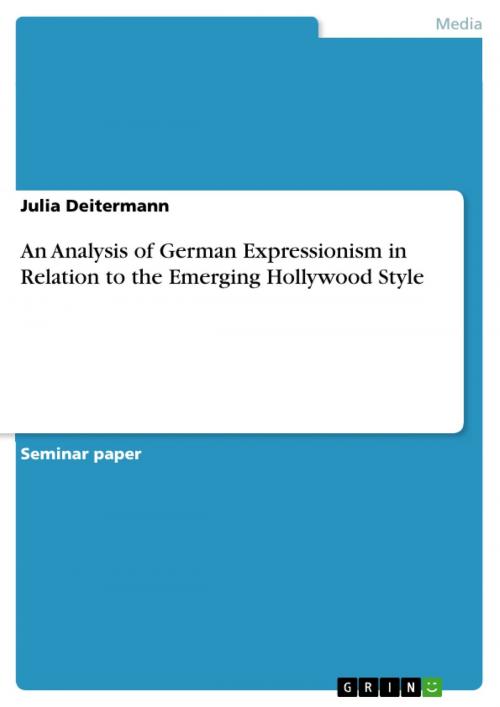An Analysis of German Expressionism in Relation to the Emerging Hollywood Style
Nonfiction, Entertainment, Performing Arts, Film| Author: | Julia Deitermann | ISBN: | 9783638546256 |
| Publisher: | GRIN Verlag | Publication: | September 18, 2006 |
| Imprint: | GRIN Verlag | Language: | English |
| Author: | Julia Deitermann |
| ISBN: | 9783638546256 |
| Publisher: | GRIN Verlag |
| Publication: | September 18, 2006 |
| Imprint: | GRIN Verlag |
| Language: | English |
Seminar paper from the year 2004 in the subject Film Science, grade: A, San Diego State University, course: Film History & Aesthetics, 2 entries in the bibliography, language: English, abstract: In the first twenty years of film history, Hollywood had already conquered large parts of the world through the creation of artistic silent films. While American filmmakers, such as D. W. Griffith, focused on montage, continuity, and coherence as a means of narrating a story, thus making the narration more comprehensible and the characters more reliable, German filmmakers predominantly emphasized the mise-en-scène of the film when they created a new genre - the Expressionist film. In general, Expressionism is a term used for the distorted representation of reality which attempts to reveal an inner vision of the soul that is shaped by fear and wonder at the same time. The rise of German Expressionism after World War I can be traced back to a number of reasons. First of all, society was shattered by years of war and the rapid changes that had taken place in the last decade. The political system of the monarchy was abolished to pave the way for a parliamentary democracy. However, the Weimar Republic was politically instable, a revolution was put down and economy was not flourishing. The cultural movement of Expressionism represented all the changes in society, among them industrialization, the boom of radio and film, and Einstein's and Freud's revolutionary approaches to the world; all of which provoked the need of a new representation of reality. Moreover, people not only longed for entertainment and distraction in this insecure new world, but also did they inherit a new sense of 'intellectual liberation' after censorship was ended and women were allowed to vote. Furthermore, the German film industry lacked film imports from other countries and decided to become involved in international film business itself, thus creating the large film company Ufa (Universum Film AG) that still exists today. Ufa produced films of various genres, but the most popular and influential in the world was to become the Expressionist film. Expressionism insofar forms a sharp contrast to Impressionism and Naturalism, as it does not attempt to depict momentary impressions of the world, nor does it aim at presenting the physical world as it is. On the contrary, it portrays an interpreted psychological and spiritual reality, thus revealing the underlying essence and meaning of things. As a result, reality can be seen as a creation of the mind, which calls for the viewer's interpretation. [...]
Seminar paper from the year 2004 in the subject Film Science, grade: A, San Diego State University, course: Film History & Aesthetics, 2 entries in the bibliography, language: English, abstract: In the first twenty years of film history, Hollywood had already conquered large parts of the world through the creation of artistic silent films. While American filmmakers, such as D. W. Griffith, focused on montage, continuity, and coherence as a means of narrating a story, thus making the narration more comprehensible and the characters more reliable, German filmmakers predominantly emphasized the mise-en-scène of the film when they created a new genre - the Expressionist film. In general, Expressionism is a term used for the distorted representation of reality which attempts to reveal an inner vision of the soul that is shaped by fear and wonder at the same time. The rise of German Expressionism after World War I can be traced back to a number of reasons. First of all, society was shattered by years of war and the rapid changes that had taken place in the last decade. The political system of the monarchy was abolished to pave the way for a parliamentary democracy. However, the Weimar Republic was politically instable, a revolution was put down and economy was not flourishing. The cultural movement of Expressionism represented all the changes in society, among them industrialization, the boom of radio and film, and Einstein's and Freud's revolutionary approaches to the world; all of which provoked the need of a new representation of reality. Moreover, people not only longed for entertainment and distraction in this insecure new world, but also did they inherit a new sense of 'intellectual liberation' after censorship was ended and women were allowed to vote. Furthermore, the German film industry lacked film imports from other countries and decided to become involved in international film business itself, thus creating the large film company Ufa (Universum Film AG) that still exists today. Ufa produced films of various genres, but the most popular and influential in the world was to become the Expressionist film. Expressionism insofar forms a sharp contrast to Impressionism and Naturalism, as it does not attempt to depict momentary impressions of the world, nor does it aim at presenting the physical world as it is. On the contrary, it portrays an interpreted psychological and spiritual reality, thus revealing the underlying essence and meaning of things. As a result, reality can be seen as a creation of the mind, which calls for the viewer's interpretation. [...]















